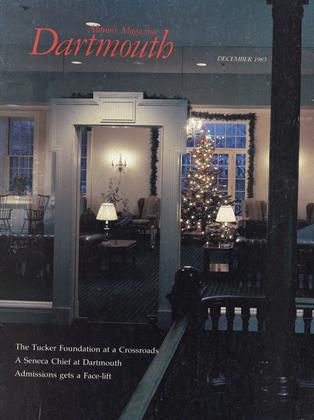The Jean Passanante remembered by most of those who knew her at Dartmouth from 1971 to 1975 was an actress an exceptionally powerful actress who brought a not-in-the-least-adolescent energy and insight to roles as different as Arkadina in The Seagull, Sister Jeanne in The Devils, and that sexpot Lulu in The Birthday Party. And it is through her acting, as the droll and beautifully self-confident Congressional aide in Return of the SecaucusSeven, that her post-Dartmouth career is best known to her College contemporaries. But anyone who watched her at work as the first woman president of the Dartmouth Players, or who got caught up in the almost passionate study she made as a senior of the work of Harold Pinter always knew that there was much more to Jean Passanante's theater world than the smell of the greasepaint. And to them it comes as no surprise that she has moved metaphorically to center stage, ahead of others of her generation, in the capacity of (cruelly despised word) administrator. As of the fall of 1983 she is the first artistic director of the New York Theatre Workshop.
Theater in New York City, especially the not-for-profit, off-Broadway part of it, is full of enterprises With somewhat similar names and rather-more-similar aspirations; and most of them come to little or nothing in their effort to gain the kind of sure footing that enables establishments like the New York Public Theatre (the Joseph Papp miracle) or the Manhattan Theatre Club (of which, incidentally, Barry Grove '73 is the brilliantly effective managing director) to do such valuable work for new playwrights. All of them exist in order to play a part in keeping hope alive that serious, provocative, demandingly rewarding drama will survive, alive on. stage, into the next generation. So high is the risk, however, so rare the success, that one might well follow the line of maximum discretion and avoid the possible future embarrassment of having drawn attention to Jean Passanante's move so soon after it has been made, were it not for the qualities in her which led the NYTW powers-that-be to ask her to give up her influential work with the prestigious Eugene O'Neill Theater Center. And were it not for the fact that the so-very-savvy Passanante must have recognized unusual qualities in the people who did the asking. It's the very opposite of a vicious circle when someone with a strong track record responds to the faith of perceptive people who offer a dark horse candidate the chance to launch something new that they believe in deeply.
The NYTW — as yet without theater premises—will seek to make its mark as an institution dedicated to the presentation of new plays, using very talented actors and directors, in whatever format (reading, workshop, full-fledged production) seems most appropriate to the playwright. It will commission new work from writers with whom it will hope to establish the kind of symbiotic relationship between playwright and company that has proved uniquely nourishing at many points in theatrical history. The new artistic director took special pleasure in finding that one of the commitments made during the period before the decision-making that led to her own appointment was to Peter Parnell '74, one of the most talented of the people with whom she worked closely at Dartmouth.
One of the less agreeable discoveries was the realization that (at least to begin with, before a track record is acquired) she would be short of good plays to read and consider for production; but having come from two years of the agony of sorting through the roughly 1,800 plays submitted annually to the O'Neill Center's National Playwrights' Conference at Waterford, Conn., there's a certain relief about it too.
When the first choices of plays have been made and a theater leased, the rest of the artistic director's decisions —casting, designing, creating will follow fast. The young producers who chose Jean Passanante to be the one making those decisions will be joined by all the Dartmouth and post-Dartmouth people who know her as one for whom it is reasonable to have great expectations, will be joined in watching confidently for unusually stimulating results.
And will she also act? All the signs point to her having come to terms completely, comfortably, and confidently, with a decision she made a couple of years ago, to give up acting altogether. It's probably the only decision her admirers would quarrel with or grumble about. P.D.S.
Jean Passanante '75, here playing Arkadina in a 1974 Dartmouth Players production of The Seagull, has recently moved to the other side of the footlights as artistic director of the NewYork Theatre Workshop.
 View Full Issue
View Full Issue
More From This Issue
-
 Feature
FeaturePsycho-Social Dynamics and the Prospects for Mankind
December 1983 By Charles E. Osgood '39 -
 Feature
FeatureMaris Bryant Pierce: A Seneca Chief at Dartmouth
December 1983 By Howard A. Vernon -
 Cover Story
Cover StoryCROSSROADS
December 1983 By Shelby Grantham -
 Feature
FeatureOn a Scale of 1 to 10...
December 1983 By Brad Hills '65 -
 Feature
FeatureAdmissions gets a Face-lift
December 1983 By Nancy Wasserman -
 Sports
SportsSports
December 1983 By Kathy Slattery







